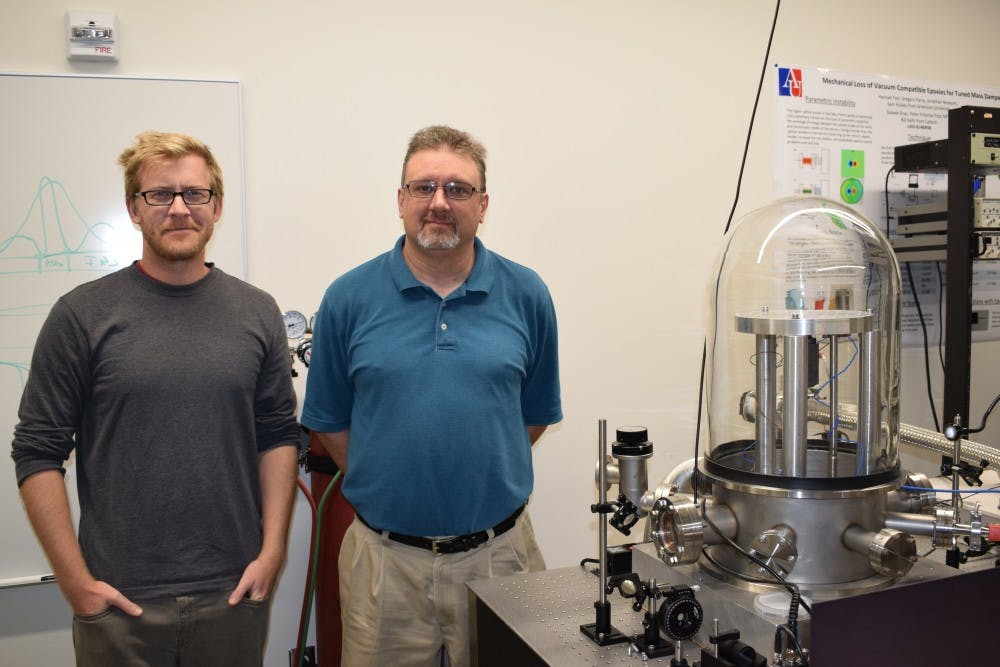Gregory Harry hopes to change the way humans perceive the universe with his research on gravitational waves, and his recent research may have done just that.
The AU physics professor’s contributions to the LIGO-Virgo detector collaboration helped Rainer Weiss, Barry Barish and Kip Thorne win the 2017 Nobel Prize in physics. Harry was honored when he found out the LIGO earned the prestigious award.
“For me it was most satisfying to see the work I had done lead to the detection of gravitational waves,” Harry said. “I was very happy for the Nobel prize winners as they had put so many years into this work.”
Harry’s research builds upon Einstein’s original prediction that gravitational waves existed from his description of gravity. Gravitational waves are waves given off as masses move, similarly to how visible light and other electromagnetic waves behave. Unlike electromagnetic waves, however, gravitational waves are much more difficult to detect.
To study these waves, detectors like the LIGO observatory in Louisiana use laser beams and special glass mirrors to pick up the waves and measure their movement. Harry’s experiments are focused on replicating and improving upon the design of the LIGO mirrors, he said. In the lab, he and his team, including senior Maya Kinley-Hanlon, test different glass samples and optical coatings to figure out how to pick up waves accurately while eliminating as many extraneous variables as possible.
“A big part of the problem is because they’re gravitational waves and have such a small effect, there are all kinds of other things, more mundane things, that can also move the mirrors,” Harry said. “The trick with building these detectors is both to try to isolate away those effects and to the extent you can’t do that, to understand all these noise effects that you have to remove them from your data.”
Harry aims to better understand Einstein’s description of gravity and theories of quantum mechanics by studying these gravitational waves. He found that Einstein’s theories explain the way gravity works on a much larger scale while quantum mechanics explains it on a microscopic scale.
“Some of the smartest people in the world have spent their whole careers trying to figure out how to do that, and haven’t been able to do it,” Harry said. “I kind of came to the conclusion that what we needed was more data. It didn’t matter how smart you are or how hard you worked on it, we just didn’t have enough information to really understand how to describe both gravity and quantum mechanics together.”
Lab director Newport, who has worked with Harry on gravitational wave detection for seven years, believes that studying gravitational waves could potentially change the way humans view the universe. Newport said gravitational waves can detect objects in space that have never been seen before, such as black holes. Just a few weeks ago in the lab, the gravitational wave detector picked up waves from a neutron star in spiral, something that was hypothesised to exist by Harry and Newport but no evidence was found until now.
“This telescope is measuring astronomical sources in a way that no other telescope does,” Newport said. “Gravitational waves are a completely different type of way of probing the universe. We’ve already discovered so many things that we didn’t know before.”
In the two years that Maya Kinley-Halon has been part of the program, she has gained valuable experience in the field and a mentor in Harry. Kinley-Hanlon said she is thankful to have Harry as her mentor because he provided many of the connections and tools she needed to help her publish her first article in a scientific journal.
“Not a lot of people are able to have such a supportive person that helps them so early in their career,” Kinley-Hanlon said.
As Harry continues to move forward with his experiments, he hopes that gravitational wave detection can give people a better understanding of astronomy and Einstein’s methods.
“Being able to see the universe in a different way just gives you a very different perspective on things,” Harry said. “Up until now, we’ve been completely deaf, but if all of a sudden you go from being deaf to hearing, it’s just like a whole different world.”
This article was originally published in the December 2017 print edition of The Eagle.





